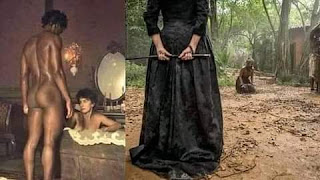"Katherina Hetzeldorfer, tried “for a crime that didn't have a name
Remembrance for All Hallows Day: "Katherina Hetzeldorfer, tried “for a crime that didn't have a name” (same-sex sexual relations) and sentenced to death by drowning [in the Rhine], iny song t1477." "Hetzeldorfer had moved to the city of Speier, Germany, from Nuremberg with a woman who, during the trial, Hetzeldorfer claimed was a sister. They had lived in Speier for two years before Hetzeldorfer was arrested. The two had apparently confided in members of the community, describing the nature of their relationship as being like that of a husband and wife. After intense cross-examination, Hetzeldorfer revealed that the woman was not a sibling, but that they had had a long-standing sexual relationship. (Hetzeldorfer’s wife may have escaped, because her words are not recorded in the trial transcripts.)
"Female witnesses who claimed to have been seduced by Hetzeldorfer described him/her as “being like a man in both physique and behavior, a sexually aggressive character and a potent lover.”
"Hetzeldorfer and these witnesses were made to describe in detail how it was that Hetzeldorfer acted like a man; their answers included the description of the use of an “instrument” and how it was made: “with a red piece of leather, at the front filled with cotton, and a wooden stick stuck into it, and made a hole through the wooden stick, put a string through, and tied it round.” It was the use of this “instrument,” combined with Hetzeldorfer’s gender transgressions, that led to death by drowning, a particularly demeaning sentence reserved for women."
Regarding "crime without a name," there were words for male homosexuals, negative ones like "sodomite" and "catamite," but lesbians are far less visible, and very difficult to uncover in the historical record.
"Charles aka Mary Hamilton, publicly whipped for impersonating a man in eighteenth-century England; Clara, aka “Big Ben,” over whom two jealous women fought in 1926 New York: these are just three of the lives that the artist Ria Brodell has reclaimed for queer history in Butch Heroes. Brodell offers a series of twenty-eight portraits of forgotten but heroic figures, each accompanied by a brief biographical note. They are individuals who were assigned female at birth but whose gender presentation was more masculine than feminine, who did not want to enter into heterosexual marriage, and who often faced dire punishment for being themselves.
"Brodell's detailed and witty paintings are modeled on Catholic holy cards, slyly subverting a religious template. The portraits and the texts offer intriguing hints of lost lives: cats lounge in the background of domestic settings; one of the figures is said to have been employed variously as “a prophet, a soldier, or a textile worker”; another casually holds a lit cigarette. Brodell did extensive research for each portrait, piecing together a life from historical accounts, maps, journals, paintings, drawings, and photographs, finding the heroic in the forgotten."




Comments
Post a Comment